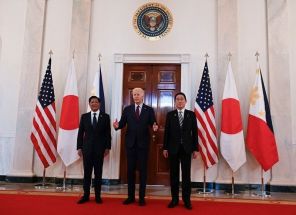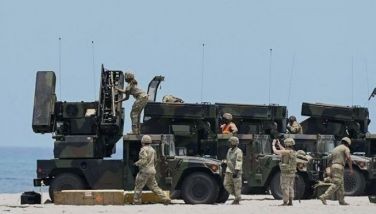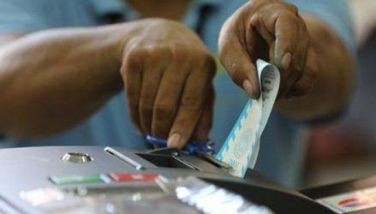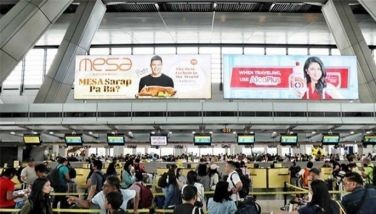Duterte: Bombing mosques where Maute hold captives up to AFP
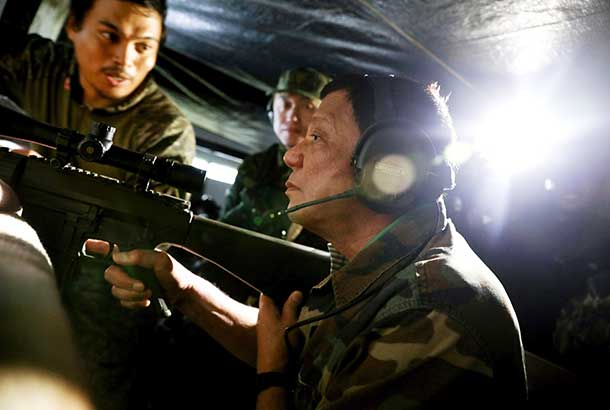
In this photo provided by Malacanang Palace in Manila, clad in a combat uniform and a protective vest, President Rodrigo Duterte holds an assault rifle during his third visit to the embattled Marawi city in southern Philippines Thursday, Aug. 24, 2017. Duterte traveled Thursday to the main battle zone in southern Marawi after Philippine troops finally recaptured a main mosque where Islamic State-linked militants had taken cover with their hostages in the three-month siege of the city, the military said. Malacañang Palace via AP, File
MANILA, Philippines — President Rodrigo Duterte on Wednesday evening said that had had given the military several options, including bombing mosques with Islamist militants and hostages, to end the siege of Marawi City which already entered its 100th day.
The president’s decision to have put all options on the table contrasted with his earlier apprehension about hitting mosques, which he said would put the dozens of hostages that Maute terrorists were still holding in harm’s way.
This would also fuel the anger of many residents of the Islamic City of Marawi, many of whom have had their property and homes destroyed by the fighting that started in May, according to Duterte.
The siege of the Philippines’ only Islamic city is the most serious security problem to confront the administration of Duterte, a Mindanao native whose election to the presidency bolstered hopes that peace would finally be achieved by the 22 million residents of the country’s second largest island.
The conflict has highlighted the severe operational deficiency of the Philippine military, which has stopped announcing self-imposed deadlines to end the siege.
"I will admit to you now, bakit matagal „yung sa siege sa…? Matagal na ?yan sa on deck na talagang gusto bobombahin ang mosque to capture or kill the leaders there and in the process, sacrifice „'yung mga hostage who are all Filipinos, maybe Maranaos and a mingling of Christians, Tagalog, nandiyan. Kung gusto na nilang lusubin noon, sabi ko, "Ayaw ko'," the president said.
"And they would start maybe to bomb the mosque. Hindi lang ni — ngayon ko lang ito nasabi. Kaya natagalan „yan, sabi ko, 'Huwag, mahirap 'yan'," he said.
Strategy up to military
Duterte said that he left the crafting of the strategy to end the stalemate in Marawi to the Armed Forces when he last visited the besieged city.
“Yung the last time I was there, that would be around five days ago, six days ago, I finally said na ano, ‘The option is already yours because we cannot have a stalemate for over one year,’” he said in a speech.
In June, Brig. Gen. Restituto Padilla, Armed Forces spokesman, said that the military will not bomb mosques despite reports that the Maute terrorists were holding hostages there.
"If the enemy uses the parapets or the high areas of the mosque as potential sniper lairs, we may hit on those areas alone but we will not bomb the mosque itself," the military spokesman said then.
The military has since recovered the Grand Mosque and the St. Mary's Cathedral from the terrorists.
'Emissary sent to talk to terrorists'
Duterte however emphasized that he would rather avoid a “bloodbath” in the city, saying he had already sent an emissary to talk with the Maute group.
“Pero kung sabi ko lang na ano, kung sana makiusap na lang tayo na lumabas na lang and free the hostages, do not harm them, do not cut their heads because mag-init lalo,” the chief executive said.
“But I have my limits even if I am president, hanggang diyan lang ako. I cannot go beyond that,” he said.
Duterte said that his desire to save the lives of the hostages was what prolonged the conflict which is already in its fourth month.
He also admitted that a lot of people in the government, including security and local government officials, were already impatient with the length of the siege.
The siege of Marawi, which has already claimed the lives of hundreds of militants, soldiers and civilians and displaced thousands of families, has been labeled as the most serious terror event to have hit Southeast Asia in the past 15 years.
Aside from showing the military’s disadvantages, the siege has also bolstered the image of Isnilon Hapilon, the appointed emir of the so-called Islamic State in Southeast Asia, among terror communities which could fuel his recruitment of more fighters in the future.
- Latest
- Trending





















